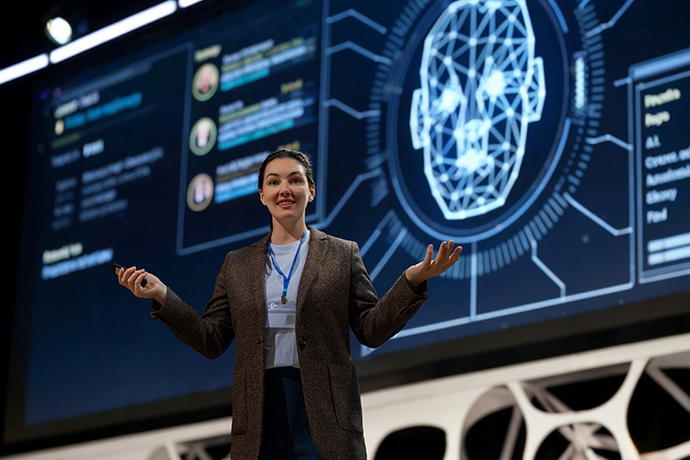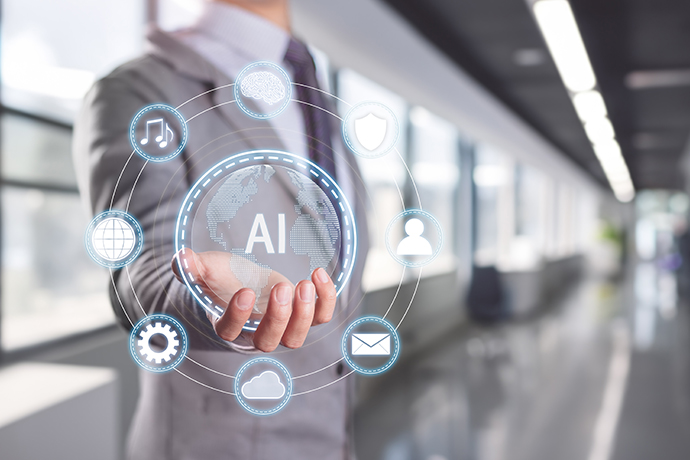 SPEAKERS
SPEAKERS
As AI makes rapid advancements, there’s always this question of whether it can be better C-level leaders than humans. Join us as we explore the limits of AI and how humans have an edge here.

A few years ago, AI leaders seemed far-fetched. But with the rapid advancements in the last few years, especially with the emergence of generative AI and Artificial General Intelligence (AGI), it no longer seems like a sci-fi movie.
That said, what would AI leadership look like? Is AI better than humans at the C-level?
Read on as we explore the answers to these interesting questions.
AI is becoming more intelligent and capable, as it has access to almost all the information that we have created over many centuries. While it’s impossible for humans to read through every piece of written word, AI systems can do it in hours. Hence, these systems know way more than what humans can ever know.
Another distinct aspect is its processing capability. When posed a question on an unknown subject, we have to read through different materials to come up with an answer. Though the process is the same for AI, it can do so in minutes.
Similarly, AI systems can correlate and analyze diverse datasets and provide new insights within minutes. This aspect is also hard for humans to replicate.
Overall, access to unlimited information and extensive processing power give AI an edge over humans when it comes to finding solutions to problems.

Many research studies also affirm the growing power of AI. A study by Harvard Business Review, for example, involved 344 participants and used the power of GPT-4o, a model by Open AI. This experiment was conducted from February to July 2024, where participants and ChatGPT were given a set of gamified simulations that mimicked the challenges that CEOs face in the real world.
There were 500,000 possible decision combinations, and participants had to survive each round without getting fired by the virtual board. The goal of this simulation was to maximize the market cap, and certain Key Performance Indicators (KPIs) were used to judge the participants.
At the end of this study, GPT-4o clearly outperformed humans across every metric. It made better decisions and earned higher market share and profitability for the fictitious company.
However, it failed miserably during black swan events like a market collapse, the COVID-19 pandemic, changing consumer expectations, etc.
This shows that AI works great in controlled environments and predictable situations. It can also quickly learn and iterate to implement strategies faster and more efficiently than humans. However, this approach may not work in unpredictable situations, and humans rule in these situations.
Humans still have an edge over AI when it comes to handling complex scenarios, and here’s why.
Emotional intelligence, often called Emotional Quotient (EQ), is the trait that helps us understand human emotions. It also helps us establish a connection with other humans and build trust.
EQ gives us an edge over AI because it helps us understand complex human emotions and react to them accordingly. This is one of the biggest reasons why AI failed in the HBR study we discussed above. Because it could not gauge how humans would respond to a situation.
Given the wide cultural, social, and geographical variations, it’s hard for AI systems to respond to emotional states in real time. On the other hand, this is what we do best, and this is why humans will be better than AI as business leaders.
While making decisions, we consider factors like fairness and values. In some ways, these ethics enable us to make decisions that consider human emotions. Also, this rationale explains why all our decisions are not the same across situations.
AI is incapable of processing these ethical elements, which explains why it produces the same output based on the available measurable variables. Moreover, it is also why AI decisions can falter at critical times.
Another important aspect is critical thinking. Again, our ability to think in a certain way stems from a combination of factors like upbringing, education, social environment, beliefs, and more. These complex factors are also what makes each of us unique and gives us a distinct personality, which in turn, shapes our approach to problems as well.
AI systems do not have this uniqueness. They are more likely to deliver a similar output for identical inputs. In other words, it is based on instructions and patterns without an eye on the bigger picture.
A closely related aspect of critical thinking is innovation and creativity. We can connect unrelated ideas to create new concepts or products. We have a better understanding of what would appeal to other humans and can create accordingly. AI is not capable of these finer aspects of human existence.
All the above aspects give humans a clear advantage over AI when it comes to making the best decisions and leading organizations.

Ignoring AI in corporate strategy is no longer possible and is not considered a prudent approach. At the same time, it’s important to understand its limitations.
Instead of relying completely on AI, we can take a hybrid approach where the routine events and strategizing can be left to AI with human oversight. However, when it comes to unpredictable situations or those that need human qualities like empathy and understanding, humans must take over.
As C-level leaders, it’s important to know when to allow AI to take over and when to intervene and take charge.
To conclude, AI can excel in many areas of corporate strategy, provided the variables are predictable. For unknown or volatile situations, humans are better as leaders because we understand our fellow species and their differences better. Factors like EQ, ethical reasoning, and creativity give us an edge.
That said, AI is too powerful and beneficial to ignore. This is why a hybrid approach will work, where AI handles the routine decision-making while the difficult ones are taken over by humans.
To learn more about leveraging AI and co-working with it, our AI speakers can help. Also, our leadership speakers can help your C-leaders step up into this new tech age and make the most of emerging technologies. They are well-versed in the advantages and limitations of AI and have worked with hundreds of organizations.